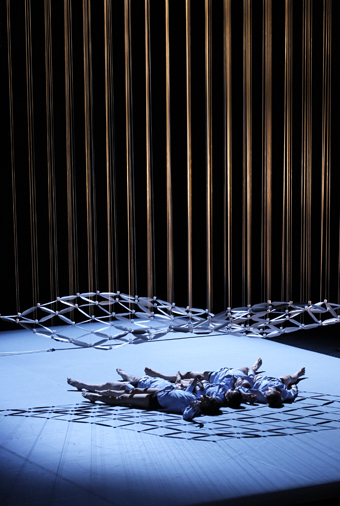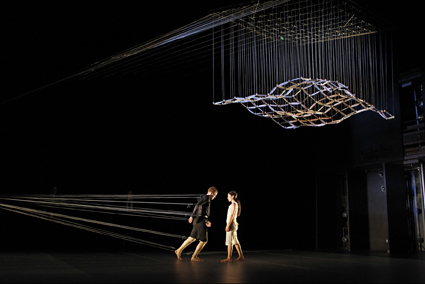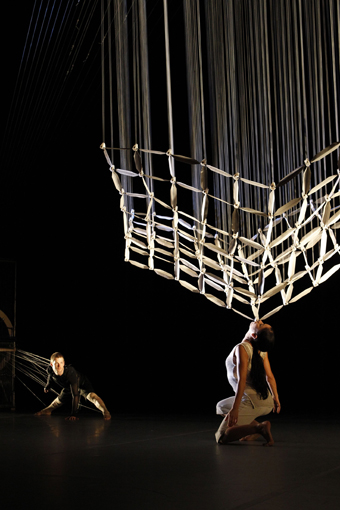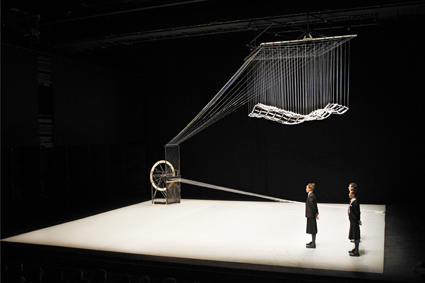the art machine dances
keith gallasch: connected, chunky move, dance massive

Harriet Ritchie, Stephanie Lake, Marnie Palomares, Alisdair Macindoe, Joseph Simon, Connected, Chunky Move
photo Jeff Busby
Harriet Ritchie, Stephanie Lake, Marnie Palomares, Alisdair Macindoe, Joseph Simon, Connected, Chunky Move
GGIDEON OBARZANEK’S CONNECTED COMMENCES WITH CONTEMPLATION AND A BLOW. IF WE WEREN’T SEATED, WE COULD BE IN AN ART GALLERY, GAZING UP AT A HUGE SCULPTURE THRUSTING TOWARDS THE CEILING OF THE MERLYN THEATRE. IT’S A MACHINE OF SOME KIND. WE PONDER ITS PECULIAR TIMBER AND STRING BEAUTY. WE ITCH TO SEE IT ACTIVATED. ONE PERFORMER APPEARS TO BE COMPLETING IT—MAKING CONNECTIONS. ANOTHER TWO PERFORMERS STAND SIDE BY SIDE; A BURST OF SOUND AND ONE IS FLUNG SIDEWAYS ACROSS THE STAGE. CONNECTIONS ARE MADE: DEVICE-BODY, SOUND-BODY, GALLERY-THEATRE, ART-WORK. THESE WILL MERGE AND ACCUMULATE IN A GROWING WEB OF ASSOCIATIONS.
A circular component of the sculpture suggests a spinning wheel and the adjacent threaded frame a loom, from which dozens of strings rise tautly to a tilted rectangular grid high above us. From there, these myriad lines descend to waist height where they are intricately linked by one or, later, more performers into another grid. This is quiet work, construction; not dance, but patterned labour.

Alisdair Macindoe, Marnie Palomares, Connected, Chunky Move
photo Jeff Busby
Alisdair Macindoe, Marnie Palomares, Connected, Chunky Move
Simultaneously, intriguing human connections are being formed—ricochets from that initial sonic blow or waves coursing from one dancing body to the next. These are forceful and unstable; appearing to spring almost involuntarily from one part of a dancer’s anatomy and rippling out into the whole and beyond into other bodies. In one passage the movement is near slow motion, evincing a kind of brutality underlined by the propulsive power of the music; in another, bodies jerk with staccato suddenness. Duos and trios appear enmeshed in the fine lines of unseen forces, like puppets on strings for all their dynamic attentiveness to each other’s transformations, evoking the imponderables of cause and effect or Chaos Theory’s maximisation of small impulses into major moves. (Sculptor Reuben Margolin reveals his fascination with waves in an interview with John Bailey and Gideon Obarzanek, in a video interview with Keith Gallasch, reflects on causality in Connections). The dancing is fascinating; I yearn to experience again its shock waves and deregulated fluency.
Work on the sculpture is complete—fine white, identical, magnetised paper shards link all the strings. The new grid is neatly horizontal. Four dancers are harnessed to the strings that emanate from the ‘loom’ and are hooked to the backs of costumes. With the pushing that pulls, the performers collectively lean forward and with great effort and concentration slowly hoist the grid high and then lower it, the mass of strings quivering with each exertion and machine stress. But it’s not mass effort that reveals the sculpture’s beauty or its subtleties. That labour is allocated to one dancer (Alisdair Macindoe) by another (Marnie Palomares) affixing all the connecting lines to his body, so that when he leans into his work he momentarily appears like a participant in an ancient Indian ritual or a performance artist whose skin has been pierced with hooks to which some great physical and spiritual burden applies. Here, astonishingly, when Palomares makes slight adjustments to Macindoe’s bearing—the angling of a shoulder, the turn of the head—it’s these that have the greatest effect on the sculpture, re-shaping the suspended grid into a floating mound or deep hollow, rippling with dancerly fluency. It’s as if, in his near stillness and beyond mere mechanics, the dancer’s spirit has passed into the art machine—such is the nature of puppetry. if here a radical inversion of the usual scale of the art.

Alisdair Macindoe, Marnie Palomares, Connected, Chunky Move
photo Jeff Busby
Alisdair Macindoe, Marnie Palomares, Connected, Chunky Move
When Palomares stands beneath the lowering grid, she faces up until it reaches her lips for a kiss between human and machine and secondarily its operator in an oddly romantic moment (Macindoe’s attention is not on Palomares but on the work effort—though he does vibrate reciprocally). However oblique the connection between the two the kiss suggests the intrinsic humanity in artistic creation—this sculpture is no mere object.
But in a sudden and surprising shift of focus, the dancer is unharnessed, the sculpture’s wheel is electrically activated and the artwork makes its own moves. It becomes, in effect, a stand-alone installation guarded by the dancers as a team of suited gallery attendants. We’re in an art gallery: but it’s not about the art. Live voices and voice-overs provide brief verbatim accounts of how people from diverse backgrounds are employed by security companies to become guards in galleries. The art there seems incidental to them, while their sense of isolation and the menial nature of their labour (“You don’t make anything; you just look at people”) is felt in neatly patterned group movement as well as words. However, there’s something in the air. The dancing sculpture and the sublimely soaring music re-shapes and undresses these sad souls, stripping them down to shirts, forming them into exquisite living mandalas, opening and closing like flowers, and finally resting beneath the descending grid with which they become one.

Stephanie Lake, Harriet Ritchie, Joseph Simons, Connected, Chunky Move
photo Jeff Busby
Stephanie Lake, Harriet Ritchie, Joseph Simons, Connected, Chunky Move
This osmotic liberation might seem corny from a distance, merely metaphorical, let alone likely in this instance, but in the moment it had an enveloping romantic logic, resonating with the surprisingly generative disjunctions in the scale of cause and effect witnessed earlier.
Connected is an engrossing creation, intensely and rewardingly collaborative, passionately danced to exacting choreography (in the first section some of Gideon Obarzanek’s best), superbly lit (Benjamin Cisterne makes the sculpture appear self-illuminating) and thrillingly scored (I can’t find the words to do justice to the haunting, compulsive compositions of Robin Fox and Oren Ambachi). Reuben Margolin’s kinetic sculpture alone is reason enough to see Connected. But that’s just the first wave of this labour of love and the work that is art.
Interview with Chunky Move director/choreographer Gideon Obarzanek about his latest work Connected, in collaboration with visual artist Reuben Margolin. Interviewed by Keith Gallasch for RealTime @ Dance Massive 2011, Melbourne, Australia.
–
Dance Massive: Chunky Move, Connected, director, choreographer Gideon Obarzanek, sculpture Reuben Margolin, performers Stephanie Lake, Alisdair Macindoe, Harriet Ritchie, Marnie Palomares, Joseph Simons, composers Oren Ambarchi, Robin Fox, lighting Benjamin Cisterne, costumes Anna Cordingley; Merlyn Theatre, Malthouse, Melbourne, March 15-20; www.dancemassive.com.au
Connected will appear at Sydney Theatre, May 10-14; chunkymove.com
See RealTime’s video interview with Gideon Obarzanek
See online interview with Reuben Margolin
RealTime issue #102 April-May 2011 pg. 15-16






